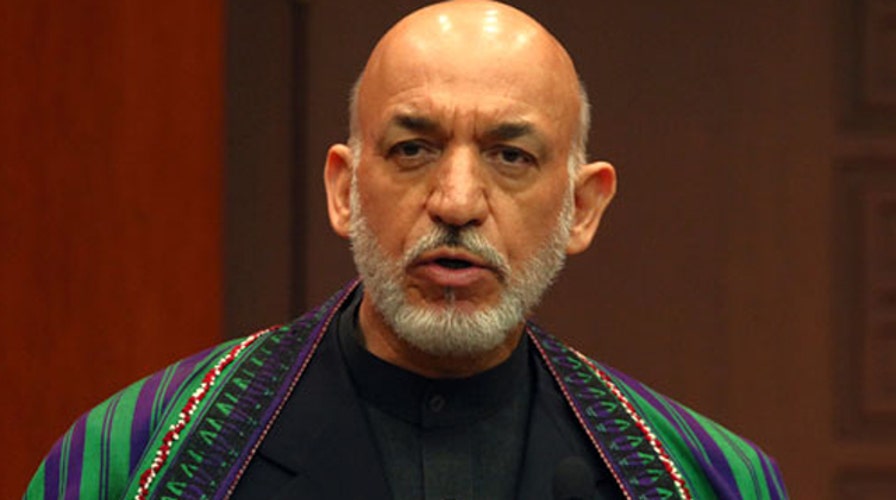Karzai to release dangerous detainees from Afghan prison
Jennifer Griffin reports from Pentagon
On the eve of a controversial prisoner release in Afghanistan, a spokesman for the U.S. military is warning the Afghan government and President Hamid Karzai not to go ahead with the plan -- since several of the 65 detainees are tied to attacks on Americans.
"Detainees from this group of 65 are directly linked to attacks killing or wounding 32 U.S. or coalition personnel and 23 Afghan security personnel or civilians," a spokesman for U.S. Forces Afghanistan said in a statement.
"It remains the position of USFOR-A that violent criminals who harm Afghans and threaten the peace and security of Afghanistan should face justice in the Afghan courts, where a fair and transparent trial would determine their guilt or innocence."
Among the 65 detainees slated for release from Parwan prison at Bagram Air Base starting Thursday morning are:
-- Mohammad Wali, apprehended in Helmand province in May 2013. He is a suspected Taliban explosives expert who reportedly was behind IEDs targeting ANSF and coalition forces. He was biometrically linked to two IED incidents, plus a latent fingerprint match linked him to another IED in Helmand province. Wali's personal property tested positive for multiple types of explosives in an explosive-residue test after his capture.
-- Nek Mohammad, captured in Kandahar province in May 2013. He is accused of facilitating rocket attacks against Afghan and coalition forces. He was apprehended with several 107mm artillery shells, mortar rounds and improvised explosive components, including at least 25 pounds of homemade explosives.
-- Mohammadullah, apprehended in Paktiya province in May 2013. He is believed to be a Haqqani network IED specialist who builds and sets IED's. Mohammadullah was biometrically linked to an IED and tested positive for four types of explosives in an explosive-residue test. He was captured with his Haqqani commander, Ehsanullah, who is also being released.
-- Ehsanullah, captured in Paktiya province in May 2013. He is a suspected Haqqani network commander who plans IED operations and attacks against ANSF and coalition forces. He was biometrically linked to a radio-controlled IED and tested positive for two types of explosives in an explosive-residue test.
At a Senate Armed Services Committee hearing on Tuesday, Sen. Lindsey Graham, R-S.C., warned Karzai that continuing with plans to release these suspected terrorists, captured by U.S. forces and handed over to the Afghans for trial, would further damage the relationship with the U.S.
"I will be introducing a resolution condemning this action by President Karzai. I will be urging my colleagues to cut all developmental aid off to Afghanistan as a response until after the next election," Graham said Tuesday. He was referring to the Afghan presidential election slated for April when Karzai is constitutionally required to step down.
"Of the 88 individuals in question, over 60 coalition forces have died as a result of the action of these 88. And I consider this a major step backward in our relationship," Graham added.
According to the Defense Department, 17 of the prisoners Karzai is set to release are directly linked to the production and placement of roadside bombs. Twenty-three of them tested positive for explosive residue when they were captured, according the Pentagon.
But Afghan officials say that they have not been able to find enough evidence to build a case against any of the 88 prisoners. Critics of the move say Karzai is doing this right now to help with his negotiations with the Taliban and that he is preparing for when U.S. forces leave the region. Karzai, likely for the same reason, also continues to refuse to sign a bilateral security agreement that the U.S. says it needs in order for any U.S. troops to remain in Afghanistan after the end of this year.
"We've undercut him all along," said Richard Grenell, a former spokesman for several U.S. ambassadors to the United Nations. "First of all, this administration has terrible relations with Karzai. We tried to put a Taliban office in Qatar, and then had to pull it back. He [Karzai] took that as a signal that we were undercutting him, and his power."





